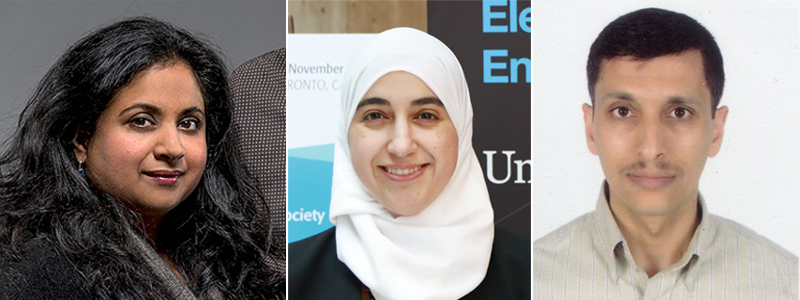
Dec. 4, 2015
Lee, Kundur win Best Paper Award at IEEE Electrical Power and Energy Conference
Co-authors Professor Deepa Kundur and Dongchan Lee brought home a Best Paper Award at the 2015 IEEE Electrical Power and Energy Conference, held Oct. 26-28 in London, Ont.
Lee, an MASc candidate in The Edward S. Rogers Sr. Department of Electrical and Computer Engineering, is also a recipient of the Hatch Scholarship, a $10,000 award that funds the research and training of world-class researchers and engineers in the fields of recovery and utilization of energy derived sustainably from the sun and other sources.
Their paper, titled “An Evolutionary Game Approach to Predict Demand Response from Real-Time Pricing,” seeks a fundamental understanding of how energy consumption patterns change as a result of variations in energy pricing. “Demand response is a method used by energy operators to manage electricity consumption in an attempt to decrease demand during peak hours,” Lee explained. Since renewable generation, such as wind or solar, is limited by the frequency of stormy or sunny days, demand response attempts to match consumption to unpredictable power generation by reducing or rescheduling the consumption. Incentive-based demand response intends to encourage consumers to alter their behaviour, in this case by offering lower energy costs.
The authors used Ontario’s demand profile from IESO, the company that manages electricity demand and supply, to create a model of consumption patterns and energy costs. This model provides an analytical framework that energy operators can use to adjust energy costs appropriately to meet their objectives.
Farraj, Hammad and Kundur win Best Paper Award at IEEE Conference on Smart Grid Communications
ECE Post-Doctoral Fellow Abdallah Farraj and PhD candidate Eman Hammad (a former Hatch scholarship recipient) along with Professor Deepa Kundur won the Best Paper Award at the IEEE Conference on Smart Grid Communications held in Miami, Fla. Nov. 2-5. In its sixth year, it is considered the premier conference in the field of smart-grid communications. Titled “A Systematic Approach to Delay-Adaptive Control for Smart Grids,” the awards committee commented that “it was a very beautiful piece of work.”
Smart-grid systems improve the efficiency and resilience of the power grid by introducing distributed control, advanced communication and sensor technologies. The authors sought to develop a delay-adaptive control to mitigate the major challenges communication delays pose to the performance of smart-grid control systems. Parametric feedback linearization (PFL) distributed controllers may be able to stabilize power systems following a physical or cyber disturbance. The relationship between the control variable and communication delay exhibited a piece-wise linear relationship, where the delay-adaptive parameter adjusts the response of the PFL control to account for the value of the delay. As a way to enhance the time delay tolerance of the power system, a delay-adaptive design was used that capitalized on the above feature of PFL control. “The delay-adaptive feedback linearization control appears to accommodate and stabilize the power system for a wider range of communication delays,” Hammad said, a useful step towards greater efficiency of smart grid systems.
More information:
Leanne Moss
Communications Assistant
The Edward S. Rogers Sr. Department of Electrical & Computer Engineering
416-978-1999; leanne.moss@utoronto.ca